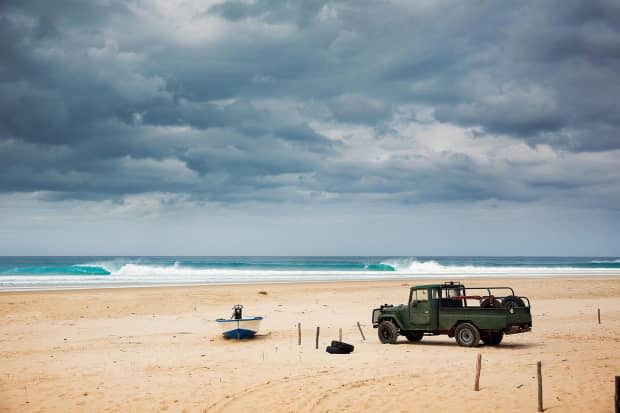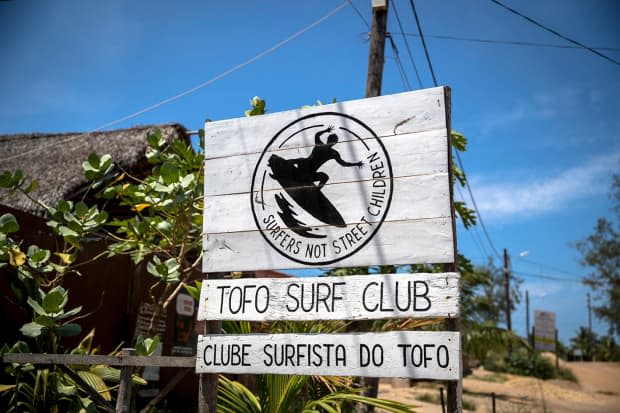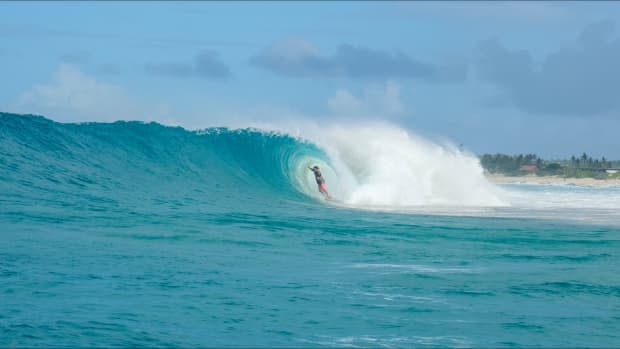Meet Mozambique’s First Pro Surfer
Sung Min Cho on being Mozambique’s first pro surfer and southeast Africa’s untapped potential
Mozambique is one of Africa’s greatest surfing frontiers. Its 1,500-mile-long coastline extends from the tip of South Africa to the tropical doldrums of Tanzania, with swathes of endless beach that give way to sharp headlands and points. During summer, fine-combed sandspits are swept to life by tropical cyclones that can occasionally produce world-class surf. Yet, up until a little over a decade ago, the country hardly had any local surfers.
That has quickly changed and the surfing hub of Tofo in Inhambane province is now home to a thriving local surf scene, spearheaded by Mozambique’s first professional surfer, Sung Min Cho, or "Mini" as he’s known.
With hundreds of miles of untapped potential and a new generation of talent, Mini believes Mozambique may well be Africa’s next surfing powerhouse. We caught up with the 23-year-old in his hometown to talk about humble beginnings, that wave, and what lies ahead for his country.
As the country’s first pro surfer, you’ve become synonymous with surfing in Mozambique over the past couple of years. Can you tell us a bit about your background?
My mom is Mozambican and I was born here in Inhambane, but my dad is originally from South Korea. We moved to South Africa when I was young. My parents went there looking for a better economic situation and we lived in Johannesburg for a while, so I grew up far from the ocean initially. Then they had the xenophobic riots (an orchestrated series of xenophobic attacks targeting foreigners that spread across South Africa in 2008 – Ed). My parents were pretty scared to keep living there, so we moved back to Mozambique and that’s when I discovered the ocean.
For a county with so much surf potential, surfing is relatively new in Mozambique. Why is that?
Yeah, there was obviously a terrible civil war that closed Mozambique off for decades, and for a long time after the country was impoverished. There was no infrastructure. It was just ruins and devastation. And so there was a lot that Mozambique had to do to get to build up to where it is now. A lot of the early surf exploration was done by Portuguese and South Africans and I guess like most surfers, they wanted to keep it a secret. There was no way for Mozambicans to get equipment really but then obviously as tourism grew, more surfers came here and we’d see them in the water. Then around 2011, Dominic King, a surfer from South Africa who was working here in Tofo, he taught the first group of Mozambicans how to surf and it took off slowly from there.
How did the local scene influence your evolution as a surfer?
I only started surfing when I was 14. After we moved back to Mozambique, I used to hang on the beach with my brothers playing football and I always used to watch the surfers and always wanted to surf but my parents couldn't afford the equipment. Then one day somebody gave me an old surfboard and that's how I started.
Were you shown the ropes?
No, I pretty much had to figure it out for myself. I had no clue (laughs) but after I got my first little glimpse of a barrel, it was all I wanted to do. At the time when I was learning how to surf, there was that first core group of Mozambican surfers, but it was a very small group, and the level of surfing was still pretty low. So it was hard to look within the surf community for inspiration and to be pushed by the level. I started surfing in 2014 and Jordy did a trip here the year after. He was the first professional surfer that I heard of and to see him surfing in real life was incredible. Jordy comes here a lot and he was really nice to us and we’ve since become friends. I don’t think there’s any other sport in the world where that kind of thing happens. So I always drew inspiration from Jordy’s surfing. He makes surfing just look beautiful.

AVG
And since then you’ve become Mozambique’s first pro surfer?
Yeah, I am the first and currently the only Mozambican professional surfer that's representing Mozambique on the world stage. But for me, I didn't want to be the first and only, I wanted to be the first of many. That’s why I started the Tofo Surf Club with Surfers Not Street Children, to grow surfing. I want to see Mozambique on the world stage in the ISA, the World Games, the Olympics. And I want to see many more Mozambican kids surfing. I don't want to be the only one.
You’ve been very actively involved in nurturing the next generation of Mozambican surfers. Why is that?
Tofo is a tourist town and everything revolves around the ocean here. Years ago, diving used to be the main attraction, and now surfing has become a huge part of people's lives and part of the community. Surfing teaches these kids to feel comfortable in the ocean, and creates a lot of opportunities for them – they can become divers, they can become lifeguards, surf instructors. It helps them embrace the opportunities that this town has to offer. But more than that, I think It helps them realize their full potential and believe in themselves. Some of the kids live in straw houses with no electricity, and they have to walk miles to get water, so it is a tough life. Surfing helps give them direction and a sense of belonging. It keeps your mind and body healthy and helps you deal with life’s challenges.
How does the club work?
It’s based on a diversion program that was started by Surfers Not Street Children in Durban, South Africa. Our goal is to provide mentorship and divert kids away from social issues and things like drugs and alcohol. You see a lot of these things in tourist towns, and so we try to divert the kids away from these issues and provide a safe space through the club. We encourage them to attend school and then afterward, we engage with them through our after-school program and use surfing as the hook. Surfing keeps them stoked, active and off the streets. So they get into a pattern of going to school, going surfing, and at the end of the day, they don't want to be drinking, doing all these other things.

AVG
One of the criticisms you often hear is that encouraging surf tourism or programs like this make the waves more crowded. Is this a concern for the locals?
I think here in Mozambique, we have a different take on localism. We understand that we are the locals and the natives from here, but we understand that we need to share the ocean with everyone because nobody owns the ocean, and we are also obviously heavily reliant on tourism and benefit from it directly. But we do believe in protecting the ocean, and this is what we teach the kids, that they need to protect their beach and the environment. So I don't think that we have any heavy localism going on. We just have a good vibe in the water and want everyone to enjoy themselves and be respectful.
You’ve said surfing is really inclusive in Mozambique. What do you mean by that?
Yeah, if you look at the program, we have a lot of kids from all different types of backgrounds, different religions, different ethnicities and also lots of females. You see the same thing in places like Senegal, in South Africa, and in this sense, I believe that Africa is leading the way for diversity and inclusion in surfing. Just here in Tofo you can see it a lot. We also have surfers like Julia – Julia was the first female surfer in Mozambique and she's broken down a lot of barriers. Gender equality is an issue here in Mozambique and to see someone like Julia, a local Mozambican from the land here – her family has roots here going back many years – seeing someone like her going into the water and riding waves is just inspiring everyone. She also has this beautiful style, especially when she’s longboarding, and radiates this beautiful attitude. She’s a big inspiration for a lot of kids.
Do you think all of Mozambique’s best waves have been discovered?
Definitely not. I think there's so much more potential in Mozambique for surf exploration. Most of the well-known waves are the more accessible spots – you can get there by car, you can fly in. I think there are still spots that you can only really get to with a boat or jetski. Or if you have a good 4x4, you can really explore. There are so many spots that probably are good and we just don't know about them.

@ianthurtell/@nownowmedia
The waves have a reputation for being fickle though. Is this true?
It depends. We actually get swell from all directions throughout the year. In winter we have swells coming from South Africa, rolling up the coast from south to north, and then in summer we have swells coming from the east to the west and then we have the cyclone swells. The spots that need the cyclone swells are obviously a lot more fickle and it’s tough because the cyclones can affect a lot of people that live in the surrounding areas if they make landfall. So we always hope that the cyclones stay in the channel and that’s the best scenario, because then we get the swell, we get the good winds, but not the devastation.
And one of the most fickle waves is the African Kirra, right?
(Laughs) Oh yeah, but when it works it’s a crazy, crazy wave. It used to be a little bit of a secret and when I started surfing I never knew why it was called the African Kirra. So I looked it up and realized it was just like Kirra in Australia, but the African version. It’s been in a lot of videos since then and more and more guys started surfing it. It’s not a secret anymore, but it’s so cool to see the local kids starting to get out there and getting barrelled.
Do you think Mozambique could become a force in global surfing?
I think so. It’s such a good breeding ground because the water is really warm, there are waves most of the year and it's accessible because you don't need much to surf, as long as you have a surfboard. There are some really talented kids starting to come up from the Tofo area and last year Mozambique was accepted into the ISA. So for the first time ever, Mozambique will be able to represent on the world stage, will be able to go to the ISA World Games and finally, we can have a national team go to the Olympics. Now that this is all possible, you can see how much it’s motivated and inspired the kids because everyone wants to be part of the national team.
You said there was a lot Mozambique had to do to get to where it is now. What’s the country like now?
Mozambique right now is booming. There’s a lot of investment coming in and it’s mostly growing in a positive way. Maputo, the capital, is such a vibrant city and there’s such a mix of cultures with people from all different walks of life. But it’s not only cities like Maputo. Even here in Tofo you can see the community is rising up and people are realizing their self-worth and their place in Mozambique. Mozambicans are very warm and friendly, and very community-minded. We look out for one another. All in all, it's just a great culture. Now that the Mozambicans are leading the charge for surf tourism asurf exploration, I think a lot of the world will start to see what we have to offer.
